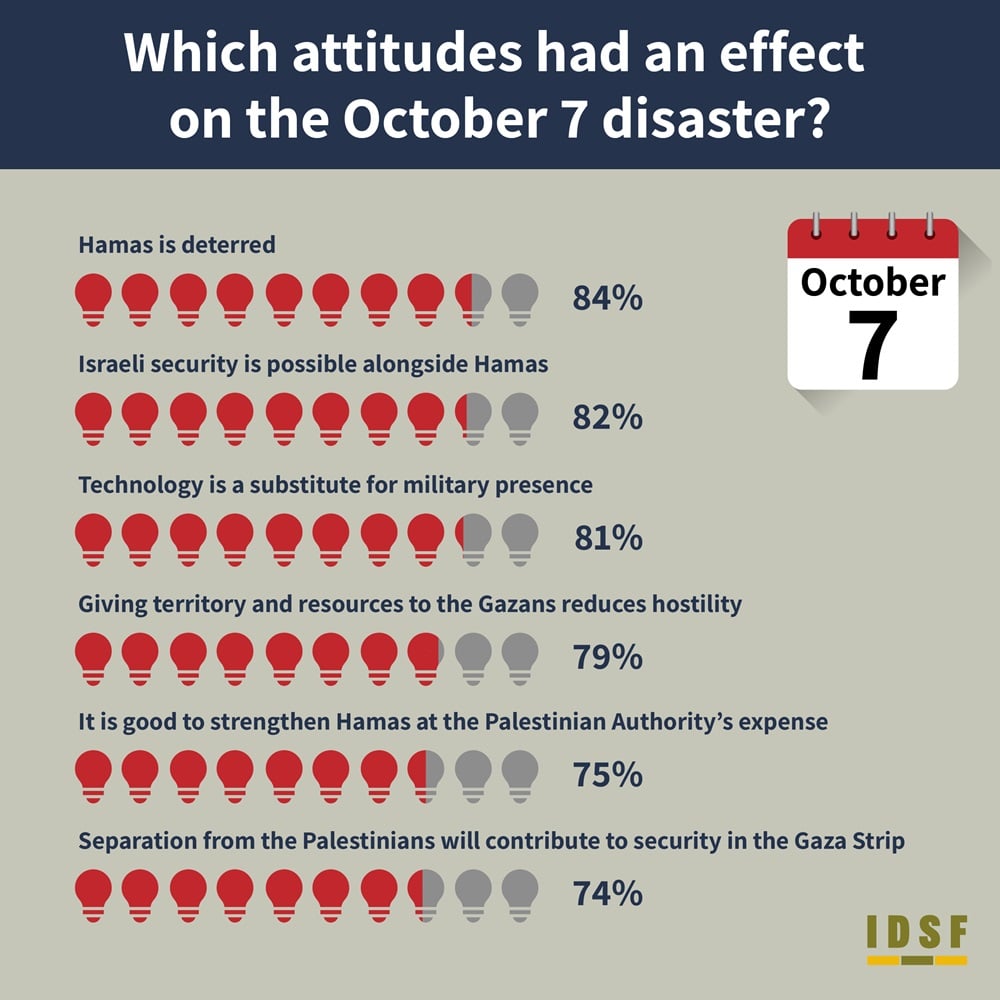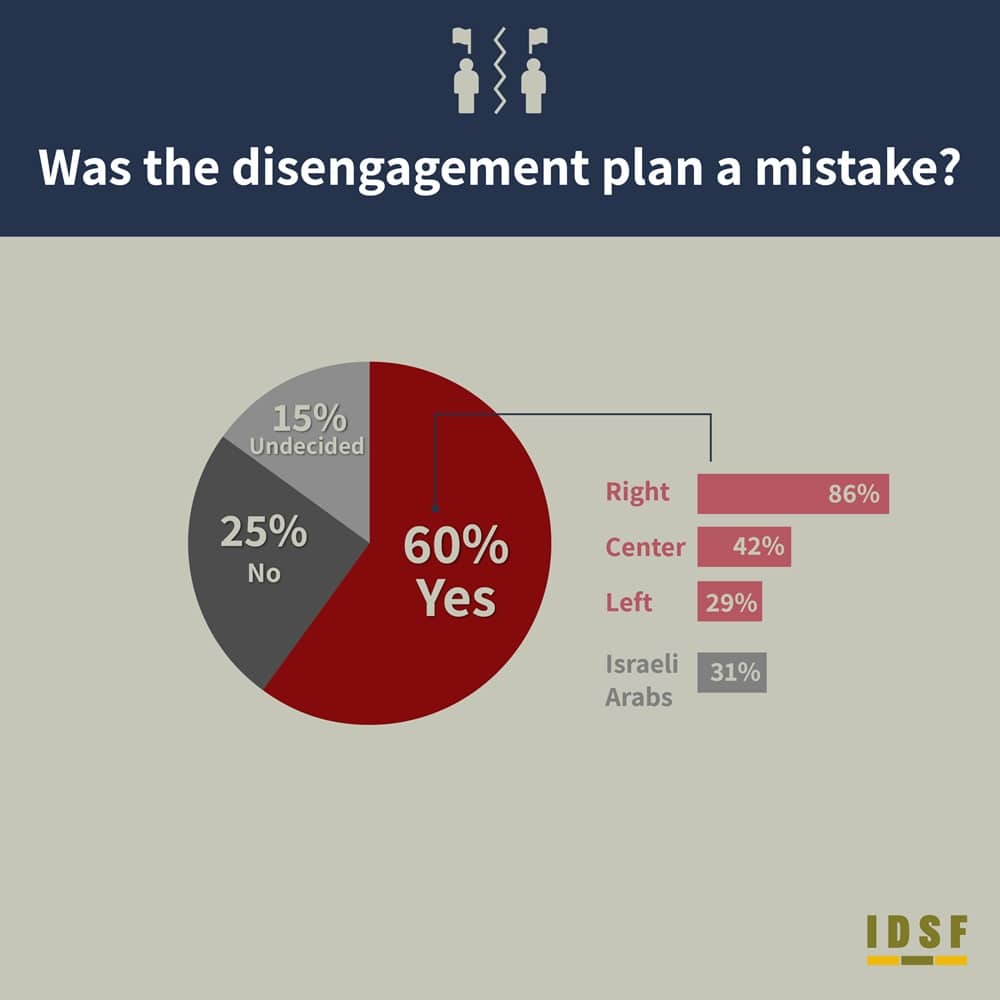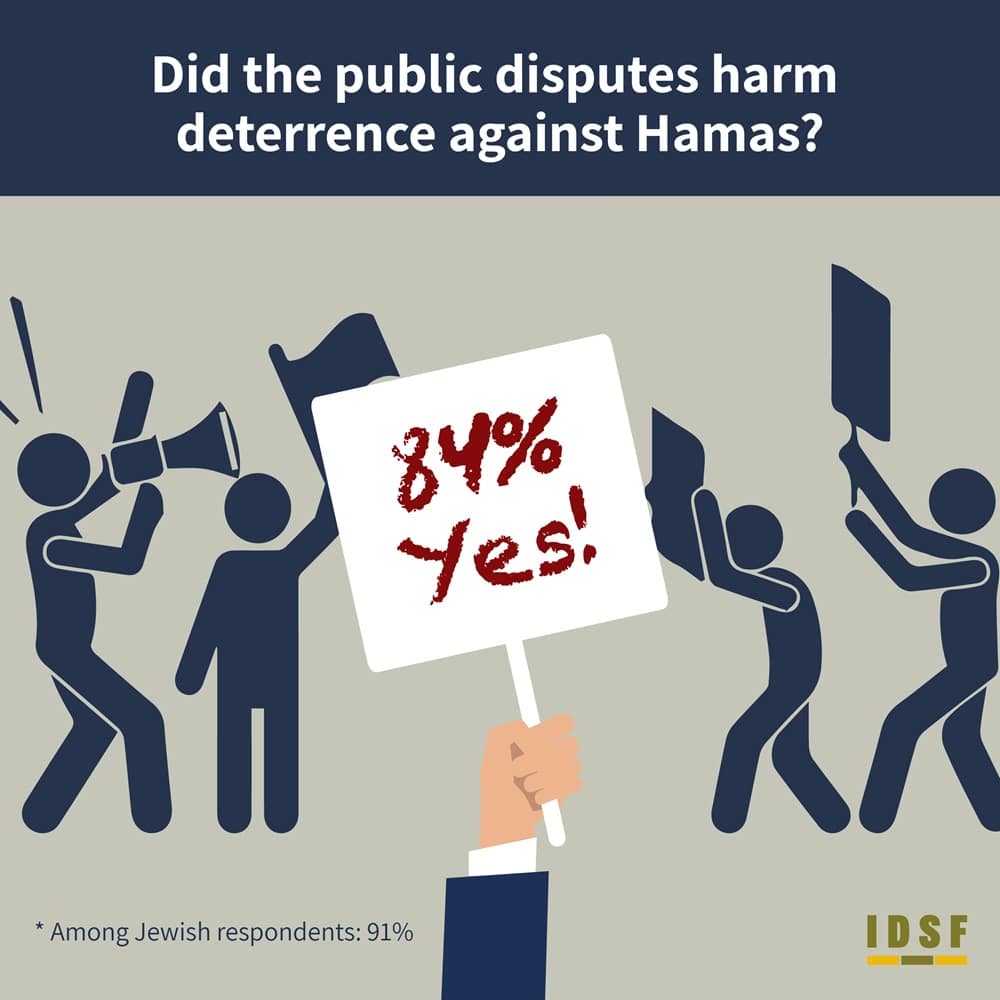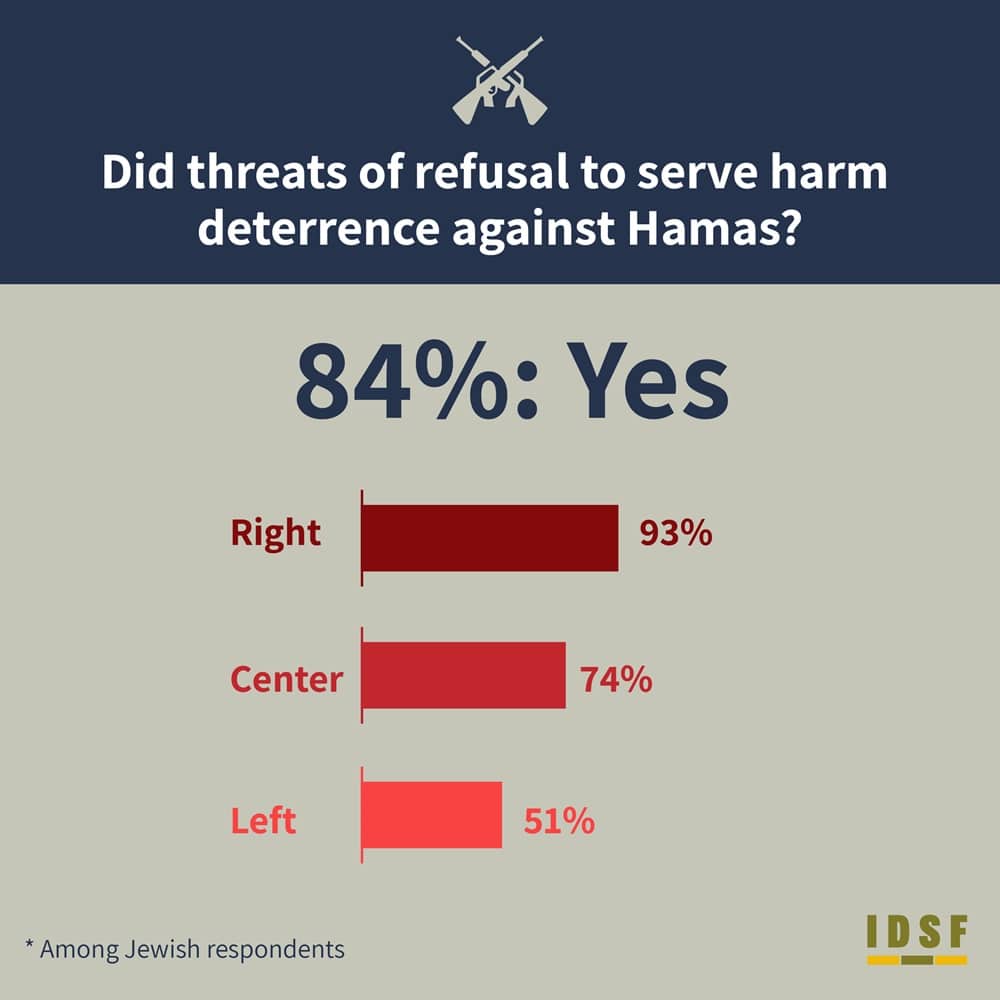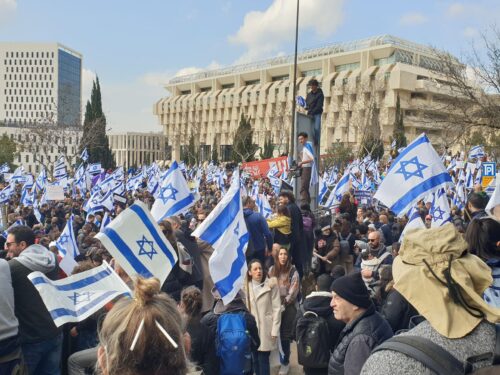The October 7 disaster and the outbreak of the Swords of Iron War spotlighted trenchant questions for discussion — about Israel’s security conceptions, and how to put the situation right, and how to keep Israel secure for the coming generations.
This time, the IDSF Index examines the Israeli public’s attitude toward the Swords of Iron War with reference to the past, present, and future. First we looked at what the public thinks of the circumstances and attitudes that brought about the October 7 disaster. Then we looked at what the public thinks of the present situation and the objectives of the war. And finally, we examined what lessons the public believes must be drawn from October 7 and what it believes should be done when the war ends.
In this article, we will deal with the first part of the survey: The day before the Swords of Iron War.
The survey was held during January 2024 on behalf of the IDSF research department, with statistical supervision from Dr. Haggai Elkayam. Responding were 1,156 adults (18+) in Israel, users of the Internet, confirmed as a representative sample according to age, gender, nationality, religious observance, and political self-identification.
For the total sample (1,156 respondents) the maximum margin for error in sampling is ±3%, at a probability of 95%. For the Jewish sample (919 respondents) the maximum margin for error in sampling is ±3.5%, at a probability of 95%. For the Arab sample (237 respondents) the maximum margin for error in sampling is ±6.5%, at a probability of 95%.
The failures that led to the disaster:
Erroneous intelligence analysis and faulty real-time behavior
The lapses that made the events of October 7 possible will yet be probed thoroughly in the future, and years may pass before the public can be sure of the reasons and of the guilty parties. In the meantime, we asked the public who they believe bears primary responsibility for the great disaster that struck the Israeli populace — the military, or the political echelon. The answer: both. But there was broader agreement regarding the role of the military in the lapse: 89% of respondents believed that the military was guilty, and 76% believed that the political echelon was.
In addition, we checked which military failures influenced public opinion regarding the disaster. 91% of the respondents believe that the crucial failure was the misinterpretation of existing intelligence, whereas only 67% of the respondents believe that intelligence information was lacking at the IDF. As to whether the misunderstanding of the situation in real time influenced the disaster, 89% answered that it did, and 86% noted that insufficient routine preparation by the IDF at the border with Gaza also influenced the events of October 7.
Another point of interest that arose in the survey is that the index of trust in the Israel Police rose by 14%. In the present survey, 39% expressed trust in the police, as against only 25% in the previous survey. The increased trust in the police may derive from its worthy and significant contribution to halting the October 7 invasion.
The conception collapsed. But what conception exactly?
One point of unanimity among the public: “The conception collapsed.” The question remaining is what exactly the conception was. Our survey asked about the extent to which the various attitudes held by the State of Israel enabled the terror attack to occur.
In first place is the belief that Hamas was deterred, mentioned by 84% of the respondents. Immediately behind are the attitude that Israeli security can be preserved while Hamas controls the Gaza Strip (82%) and the attitude that intelligence and technology can substitute for a significant military presence (81%). Two more attitudes that influenced the events of October 7, according to the respondents, are the attitude that granting territory, internal independence, and money to the Palestinian administration in Gaza will mitigate their intent to attack Israel (79%) and the attitude that Hamas should be strengthened in the Gaza Strip in order to weaken the Palestinian Authority (75%).
Another attitude presented to the survey’s respondents was that separation from the Palestinians, as carried out in the Disengagement, would strengthen the moderate forces in the Gaza Strip and calm the security situation. The results from the total sample showed 73% of the respondents marking that attitude as a possible factor in the security lapse. Broken down by nationality, 80% of the Jewish respondents saw that attitude as influencing the lapse, as against 48% of the Arab Israeli respondents. Even within the Jewish public, opinions differed. With the Jewish public broken down by ideology, it emerges that 92% of the respondents who consider themselves on the right marked that attitude as affecting the disaster as against 69% and 66% for the self-described centrists and leftists respectively.
Back to 2005: Did the Disengagement influence October 7?
One of the questions that re-emerged into discussion because of the Swords of Iron War is that of the Disengagement. Did it influence the disaster of October 7?
In the survey, we asked the respondents whether they considered the Disengagement plan a mistake. 60% of them believe that the Disengagement was a mistake, as against 35% who believe it was not a mistake and 15% who are undecided.
A breakdown by nationality shows large gaps. 68% of the Jews believed that the Disengagement was a mistake, but only 31% of the Arab Israelis believe so. An even greater gap is visible in the ideological breakdown among the Jewish respondents. On the right, 86% of the respondents believe that the Disengagement was a mistake, and on the left only 29%.
The respondents to the survey were also asked whether their opinion on the Disengagement had changed following the October 7 events. 79% of the respondents answered that their opinion had not changed, 19% answered that in the past they had considered the Disengagement correct but they now believed it was a mistake, and only 2% chose the opposite answer — that in the past they had considered the Disengagement a mistake but now they considered that it was justified.
The disputes and the refusals
The period just prior to the Swords of Iron War was very challenging for Israeli society. In the preceding years, many social and political protests were mounted and they continually intensified around the issue of judicial reform. In the shadow of those protests, calls were also heard from some reservists to refuse to report for duty.
The survey’s participants were asked about the extent to which, in their opinion, the disputes in Israeli society and the call for refusal to serve influenced Israeli deterrence of Hamas.
The results show that 84% of the total sample (and 91% of the Jews asked) believe that the disputes in Israeli society harmed Israel’s deterrent ability against Hamas. A breakdown of the Jewish population by ideological self-identification showed no significant gaps separating left, center, and right.
In contrast, on the matter of refusing or not reporting to serve, significant differences were detected in an ideological breakdown. On the right, 93% believe that refusals harmed Israel’s deterrent ability, in the center 74% believed so, and on the left only 51%.
The bottom line
The first part of the survey was intended to discern what the public thinks about the circumstances that made the October 7 disaster possible. Alongside clear disagreements among the Jews and Arabs of Israel, and between the right and left, a number of points of agreement were discovered that suggest certain important conclusions.
“We find Israeli society in broad agreement that the disputes among the people and the calls for refusal to serve harmed Israel’s deterrent abilities. This demonstrates that solidarity among the people is vital to preserving our fortitude and that the IDF must remain outside the political debate,” says Brig. Gen. (Res.) Amir Avivi, chair of the IDSF. “We also saw that it’s not one conception that collapsed, but an entire line of thinking that wasn’t in line with reality. To ensure Israel’s safety, the entire national security strategy needs to be rethought — just as the IDSF movement was warning long in advance of the war.”
In the next article, we will continue examining the survey results and see what the public thinks about the present situation — in both the national and the international arenas.

